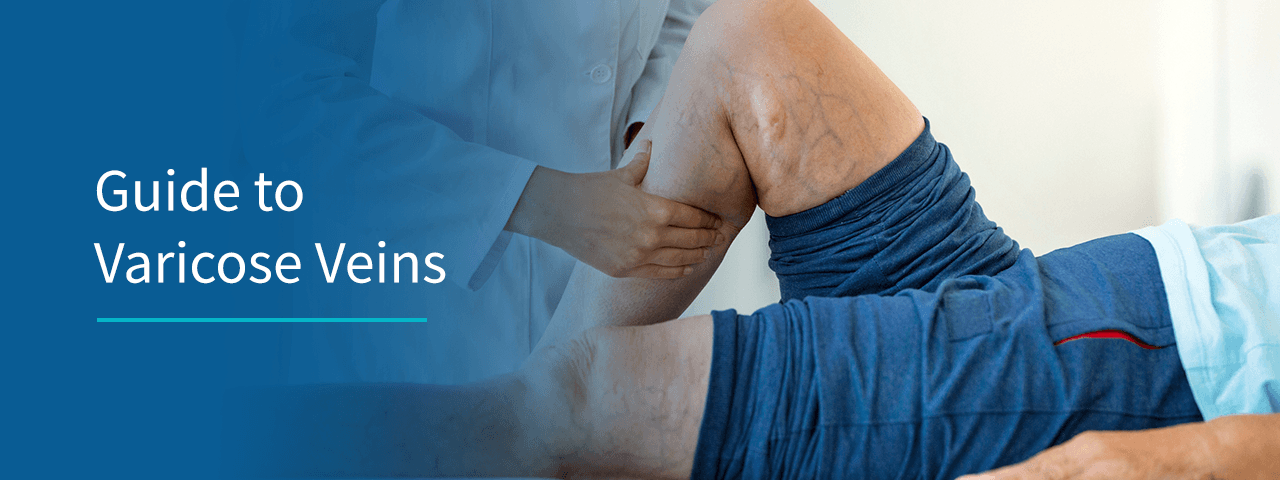
Now that knowledge is easily accessible through the Internet, it’s only natural to want to know as much about varicose veins as possible before scheduling a consultation with a specialist. However, the mountains of information available on the Internet may make it overwhelming to try and find answers to your questions. Accurate knowledge is important. The best vascular surgeons in Orlando at Central Florida Vein & Vascular Center want you to feel confident in your search for varicose vein knowledge instead of overwhelmed. We’ve compiled a list of FAQs about varicose veins so that you can easily find answers to your questions.
Your veins have valves that are responsible for circulating blood throughout your body. Unfortunately, our bodies aren’t perfect and wear down over time. These valves can weaken or become damaged, making it considerably more difficult to do their job properly. Blood ends up staying in the lower leg where the valves struggle the most to circulate blood. As a result, the vein swells and a varicose vein is formed.
Varicose veins are known for their visibility, which has caused many individuals to feel self-conscious about their legs. These swollen veins are dark, bulging, and rope-like. The cosmetic issues aren’t the only symptoms faced by those with varicose veins. These damaged veins can also cause your legs to feel heavy, itchy, swollen, or fatigued.
Varicose veins are an extremely common condition that both women and men experience. They are more frequently found in individuals over 50 and are also associated with hormonal changes during pregnancy. Family history is another factor that plays a part in developing varicose veins. If you have a relative who has suffered from them, it’s possible that you may experience them as well.
Yes. While both conditions are a form of venous insufficiency, they are not the same thing. Varicose veins are bulging, often painful, and could potentially lead to other health problems later on. Spider veins are clusters of web-like veins under the skin and are considered to be a cosmetic issue. Spider veins normally do not lead to larger health problems, although they still make some feel self-conscious. Treatment is available to lessen their appearance.
The dated, normal treatment, vein stripping, has mostly stepped down to make way for less stressful, minimally invasive treatments such as endovenous laser treatment (EVLT) and sclerotherapy. EVLT inserts a tube into the vein and applies heat to it in order to close the vein. Sclerotherapy uses a foam to collapse the damaged vein, and the vein is then absorbed by the body.
Most insurance plans will cover varicose vein treatment. However, if you have spider veins, your insurance may not cover it because it is considered a cosmetic condition instead of a health concern. As with any medical procedure, it’s best to check with your insurance company to make sure they will cover the cost of the treatment you need.
Not long at all! Patients can walk after the procedure and return home the same day. Many even go back to work the following day. While you won’t have to pause your life for treatment, you’ll still be given a leg wrap or compression stocking to wear for one to two weeks while your leg heals.
Yes, it is! It may seem as though your body needs every vein it has, but remember that a varicose vein is damaged and impeding proper circulation. That damaged vein is also only holding less than 5% of your total blood flow. When that vein is closed, the blood is automatically transferred to healthier, stronger veins that are capable of circulating blood.
Varicose veins, when left untreated, have the potential to become worse problems. The excess pressure on the veins can cause the blood to leak out of the vein and create an ulcer. It is also possible for varicose veins to lead to deep vein thrombosis, a potentially deadly condition where a blood clot forms in the vein that has the potential to move to the lung. Not everyone will experience the worst-case scenario, but receiving treatment early can help you avoid potential complications later on.
If your varicose veins are properly treated, there should not be a reoccurrence. However, it is still possible for a different vein valve to weaken and cause a varicose vein. You can help prevent this from happening by taking proper measures at home to improve your circulation and keep your veins healthy. Something as simple as a daily walk can help to strengthen those veins.
We hope that this answers some of your questions about varicose veins! Keep in mind that every person is different when it comes to varicose vein treatment. What may have been an ideal plan for your neighbor may not be the best course of action for you. That is why you should contact a specialist if you have specific questions about your own treatment. A specialist will be able to figure out what course of action is best for your current venous health.
The best vascular surgeons in Orlando at Central Florida Vein & Vascular Center are dedicated to bringing you the best treatment available for your varicose veins. We know that varicose veins can be a nuisance, and we want to help you live your life without the symptoms commonly associated with venous insufficiency. Call us today at 407-545-3385 or 352-658-5547 to schedule a consultation. We’ll be happy to answer any questions you have that may not have been covered here. You can also check out our previous blogs for more information about varicose veins and treatment.